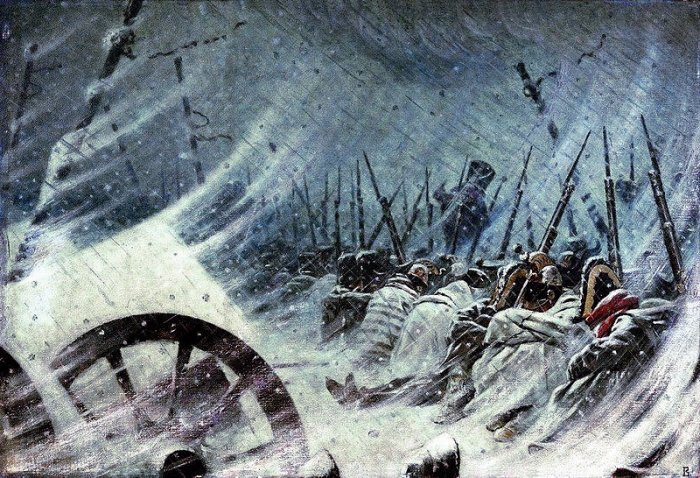Why Napoleon’s Invasion Of Russia Was A Fiasco
Ellen Lloyd - AncientPages.com - Considered by many historians to be one of the greatest military leaders of all time, Napoleon Bonaparte (1769-1821) conquered most of Europe with an array of insightful tactics.
There is no doubt that his military expansion changed the world, but Napoleon’s invasion of Russia in 1812 was a military fiasco and the beginning of the Emperor’s ending carrier.
But why was Napoleon’s invasion of Russia a disaster? Was Napoleon too overconfident or was it perhaps because Russians came up with a cunning plan?
Why Did Napoleon Invade Russia In 1812?
In 1812, most of continental Europe was already under Napoleon’s control. Why Napoleon decided to invade Russia has been debated among historians. The official version is that Napoleon wanted to protect Poland from its enemy in the East, namely Russia.
The Poles under Marshal Joseph Poniatowski, unlike the Russians, gave great support to Napoleon in 1809. Poland had been first weakened and then destroyed after its territories were partitioned by Austria, Prussia and Russia in 1772, 1793 and 1796.
However, many historians have reason to believe Napoleon had other more selfish motives to send a huge army straight to Moscow. There was an ongoing conflict between France and Great Britain that led to total war.
Napoleon set up the Continental System, an embargo on all foreign trade in an effort to weaken the British economy. The decrees of Berlin (November 21, 1806) and Milan (December 17, 1807) proclaimed a blockade: neutrals and French allies were not to trade with the British.
But Napoleon realized that extensive trade was still going through Spain and Russia, he invaded those two countries.
Napoleon wanted to isolate Britain and the invasion of Russia was an attempt to force Tsar Alexander I to submit once again to the terms of a treaty that Napoleon had imposed upon him four years earlier.
Why Did Napoleon’s Invasion Of Russia Fail?
Napoleon gathered 680,000 soldiers, from France as well as all of the vassal states of Europe. He entered Russia at the head of the largest army ever seen. His forces managed to reach Moscow and the Russians, under Marshal Kutuzov, could not realistically hope to defeat him in a direct confrontation. The Russians had to come up a cunning plan quickly before it was too late – and so they did.
Not only did the Tsar and all inhabitants escape and deserted the city before the arrival of Napoleon’s army, but they also made sure there were no great stores of food or supplies to reward the French soldiers for their long march. Then, just after midnight, fires broke out across the city, apparently set by Russian patriots, leaving Napoleon’s massive army with no means to survive the coming Russian winter.
See also:
Napoleon Bonaparte’s Nightmare Vision Inside The Great Pyramid
Napoleon Bonaparte Dies In Exile On The Island Of Saint Helena – On May 5, 1821
Napoleon’s men were shocked. They were hungry, had no shelter and winter was approaching. Napoleon ordered his troops to begin the march home. Having waited until mid-October to depart, the exhausted French army soon found itself in the midst of a very cold winter.
The Night Bivouac of Napoleon's Army during retreat from Russia in 1812. Oil on canvas. Historical Museum, Moscow, Russia.
Temperatures soon dropped well below freezing, Cossacks attacked stragglers and isolated units, food was almost non-existent, and the march was five hundred miles.
Only 110,000 out of 680,000 soldiers survived. This was the beginning of Napoleon's downfall and the rise of Russia's status as a leading power in post-Napoleonic Europe.
Written by – Ellen Lloyd - AncientPages.com
Copyright © AncientPages.com All rights reserved. This material may not be published, broadcast, rewritten or redistributed in whole or part without the express written permission of AncientPages.com
More From Ancient Pages
-
 Gnomes – Fantastic Supernatural Creatures Knowing Secrets Of Earth Mountains Rivers And Rocks
Myths & Legends | Nov 20, 2018
Gnomes – Fantastic Supernatural Creatures Knowing Secrets Of Earth Mountains Rivers And Rocks
Myths & Legends | Nov 20, 2018 -
 Proteus: Prophetic Greek Sea God Who Knew All Things, Past, Present And Future
Featured Stories | Jan 17, 2020
Proteus: Prophetic Greek Sea God Who Knew All Things, Past, Present And Future
Featured Stories | Jan 17, 2020 -
 Mystery Of The Ancient Double-Headed Eagle Symbol
Ancient Symbols | Oct 11, 2017
Mystery Of The Ancient Double-Headed Eagle Symbol
Ancient Symbols | Oct 11, 2017 -
 Three Grave Steles Unearthed At Istanbul’s 1,500-Year-Old St. Polyeuktos Church
Archaeology | Aug 24, 2023
Three Grave Steles Unearthed At Istanbul’s 1,500-Year-Old St. Polyeuktos Church
Archaeology | Aug 24, 2023 -
 Ancient Roman Joke Inscribed On A 2,000-Year-Old Pen – Discovered
Archaeology | Jul 29, 2019
Ancient Roman Joke Inscribed On A 2,000-Year-Old Pen – Discovered
Archaeology | Jul 29, 2019 -
 Stone Slab c. 9,000-Year-Old Used In Making Fire Discovered Not Far From Jerusalem, Israel
Archaeology | May 17, 2017
Stone Slab c. 9,000-Year-Old Used In Making Fire Discovered Not Far From Jerusalem, Israel
Archaeology | May 17, 2017 -
 Goddesses Of Fate And Destiny In Greek, Roman And Slavic Mythologies
Featured Stories | Sep 28, 2017
Goddesses Of Fate And Destiny In Greek, Roman And Slavic Mythologies
Featured Stories | Sep 28, 2017 -
 Sacred Ancient Texts Reveal Who Really Aligned The Oldest Monuments To The Stars
Ancient Mysteries | May 26, 2018
Sacred Ancient Texts Reveal Who Really Aligned The Oldest Monuments To The Stars
Ancient Mysteries | May 26, 2018 -
 On This Day In History: Naval Battle Of Rennell Island Fought Off Guadalcanal – On Jan 29, 1943
News | Jan 29, 2017
On This Day In History: Naval Battle Of Rennell Island Fought Off Guadalcanal – On Jan 29, 1943
News | Jan 29, 2017 -
 1.5 Million-Year-Old Human Vertebra Discovered In Israel’s Jordan Valley Sheds New Light On Migration From Africa To Eurasia
Archaeology | Feb 3, 2022
1.5 Million-Year-Old Human Vertebra Discovered In Israel’s Jordan Valley Sheds New Light On Migration From Africa To Eurasia
Archaeology | Feb 3, 2022 -
 Mysterious Coso Petroglyphs In California – Made By Whom And For What Reason?
Featured Stories | Dec 31, 2020
Mysterious Coso Petroglyphs In California – Made By Whom And For What Reason?
Featured Stories | Dec 31, 2020 -
 4,000-Year-Old Temple With Mysterious Large Monolith Discovered In Cyprus
Archaeology | Jul 10, 2024
4,000-Year-Old Temple With Mysterious Large Monolith Discovered In Cyprus
Archaeology | Jul 10, 2024 -
 Ancient Maya Astronomers Predicted Meteor Showers 2 Millennia Ago – Mayan Hieroglyphic Inscriptions Reveal
Archaeology | Sep 12, 2017
Ancient Maya Astronomers Predicted Meteor Showers 2 Millennia Ago – Mayan Hieroglyphic Inscriptions Reveal
Archaeology | Sep 12, 2017 -
 Prehistoric Dispilio: Accurately Dating Ancient Site To 5259 BC Using Cosmic Rays
Archaeology | May 21, 2024
Prehistoric Dispilio: Accurately Dating Ancient Site To 5259 BC Using Cosmic Rays
Archaeology | May 21, 2024 -
 7 Magnificent Thracian Gold Bracelets Found In Romanian Forest By Amateur Archaeologist
Archaeology | May 23, 2023
7 Magnificent Thracian Gold Bracelets Found In Romanian Forest By Amateur Archaeologist
Archaeology | May 23, 2023 -
 Ancient DNA Of Segorbe Giant Reveals A Brutal Event In Medieval Spain
News | Sep 26, 2021
Ancient DNA Of Segorbe Giant Reveals A Brutal Event In Medieval Spain
News | Sep 26, 2021 -
 How Important Was Dance In Ancient Egypt And What Purpose Did It Serve?
Ancient History Facts | May 5, 2021
How Important Was Dance In Ancient Egypt And What Purpose Did It Serve?
Ancient History Facts | May 5, 2021 -
 Has The Mystery Of Neanderthals’ Flower Burial At Shanidar Cave Been Solved?
Archaeology | Aug 31, 2023
Has The Mystery Of Neanderthals’ Flower Burial At Shanidar Cave Been Solved?
Archaeology | Aug 31, 2023 -
 Dismantled Ancient Stone Circle In West Wales Was Used To Rebuilt As Stonehenge
Archaeology | Feb 13, 2021
Dismantled Ancient Stone Circle In West Wales Was Used To Rebuilt As Stonehenge
Archaeology | Feb 13, 2021 -
 Ancient Mystery Of Giant Mounds Of Jerusalem Built For Unknown Reasons – Archaeologists Are Still Baffled
Archaeoastronomy | Aug 24, 2020
Ancient Mystery Of Giant Mounds Of Jerusalem Built For Unknown Reasons – Archaeologists Are Still Baffled
Archaeoastronomy | Aug 24, 2020



